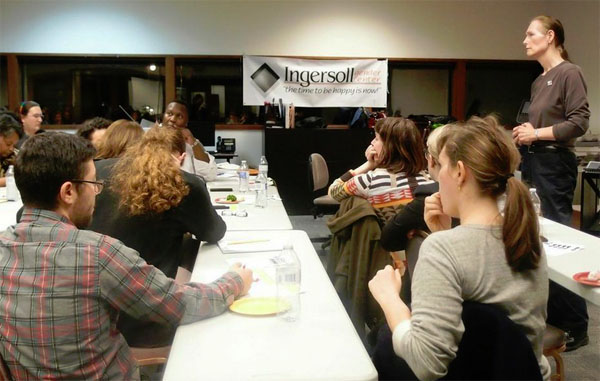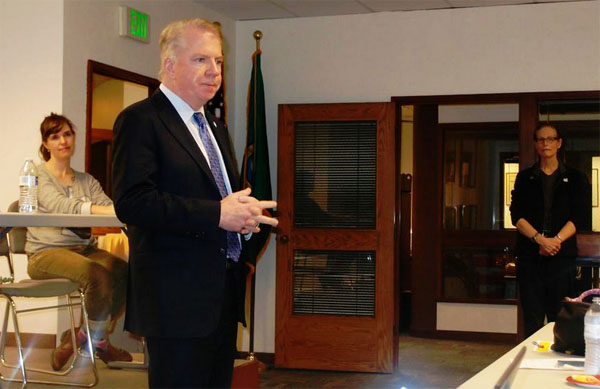OPINION
Labor, trans workers stand together to fight discrimination
By CHRISTOPHER GERMAN-JONES
SEATTLE (Feb. 19, 2015) — When you need to use the restroom, do you get in your car and drive to the McDonald’s a mile away? Hopefully not! But for many transgender workers in Washington this is just the type of dilemma they face everyday because there is no safe, reliable place for them to take their rest breaks.
Transgender rights are an area of civil and workers’ rights have made some progress, but that progress has been too slow for too long. It’s now up to the labor movement to stand together with trans workers.
 At a Feb. 12 forum hosted by the Washington State Labor Council, the “bathroom issue” was just one issue the forum opened up about with the energetic candor and optimism of lead speaker Marsha Botzer. Committee and community members alike came together with leads from the Ingersoll Gender Center to hear the results of a recent, eye opening, study and to share stories.
At a Feb. 12 forum hosted by the Washington State Labor Council, the “bathroom issue” was just one issue the forum opened up about with the energetic candor and optimism of lead speaker Marsha Botzer. Committee and community members alike came together with leads from the Ingersoll Gender Center to hear the results of a recent, eye opening, study and to share stories.
Extreme discrimination against transgender workers is common, with 72% reporting harassment on the job, 21% reporting being fired because of their status, and fully 10% of all transgender workers reporting that they have been evicted from their homes because of their status. The conversation stayed electric despite these numbers.
Even facing this kind of harsh discrimination, 78% of transgender workers report feeling more comfortable after coming out on the job. Community members shared their experiences both good and bad, focusing on what attendees could do to make Seattle a safer and more welcoming city for trans workers by, in Marsha’s words, “working not singly, but together.”
Who are transgender workers? As one participant in the forum said to heartfelt applause, “We are whole people, and we bring our whole selves to whatever context we are in.”
Transgender workers come from a wide range of racial and socioeconomic backgrounds, and these diversities are not erased by their common identity as transexual. Unemployment among trans workers as a whole is 14%, double that of the general population, while unemployment among black trans workers is 28%, double that of trans workers in general.
In spite of this kind of discrimination, trans workers stand together as highly civically engaged, with a voter registration rate of almost 90% — 18% higher than the general population — and almost 20% have served their country as veterans, more than double the general population. While trans workers represent a small minority today, they are real people with vibrant lives. More and more people up are choosing to be trans instead of gay or lesbian because it is the identity that most authentically suits them.
 Trans workers are a minority, which means it’s especially important that the labor movement stand in solidarity and represent each and every worker’s rights. To be an advocate for a just and equal workplace is to treat trans workers with the same high level of respect that you would accord any sister or brother on the job and to get involved in creating an environment that allows all of us to do our jobs together with dignity and in safety.
Trans workers are a minority, which means it’s especially important that the labor movement stand in solidarity and represent each and every worker’s rights. To be an advocate for a just and equal workplace is to treat trans workers with the same high level of respect that you would accord any sister or brother on the job and to get involved in creating an environment that allows all of us to do our jobs together with dignity and in safety.
While the forum could only last for one night, these issues are ongoing.
As Seattle Mayor Ed Murray put it in his opening remarks, “This is the side of the mountain. The view is incredible; we’ve come a long way, but it’s not the top of the mountain.”
Please, reach out to the WSLC Diversity Committee and the Ingersoll Gender Center to learn more transgender workers’ issues and learn more about what it means to be a transgender worker and how to effectively advocate for transgender workers’ in your workplace. And above all, reach out to the transgender workers in your community so that we can all work together to make Seattle the most welcoming city it can be to everyone.

Christopher German-Jones studies Labor History at the University of Washington and is a member is UW United Students Against Sweatshops.





